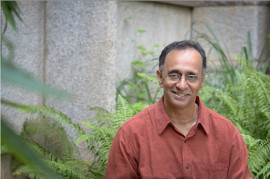Prof. Sudhir Krishna
Our group has three interests,
- Genetic diversity of dengue in india and developing nucelic acid based vaccines against dengue.
- Understanding the nature of human cervical cancer progression with a particular focus on sub-sets of CD66+ cells
- Enabling inter-campus bio-medical efforts spanning diverse areas such as hematology, HLA platforms, cancer etc.
GENETIC DIVERSITY OF DENGUE IN INDIA AND DEVELOPING NUCELIC ACID BASED VACCINES AGAINST DENGUE
The group has also received a dengue focussed philanthropic grant from Shri Narayana Murthy. Under this project, the genetic diversity profile of Dengue viruses across India was investigated in order to integrate viral diversity and sequence information to build a novel vaccine against dengue. (Jagtap S, Pattabiraman C, Sankaradoss A, Krishna S, Roy R (2023) Evolutionary dynamics of dengue virus in India. PLoS Pathog 19(4): e1010862. https://doi.org/10.1371/journal.ppat.1010862)
Taking forward the sequencing effort in developing nucleic acid based vaccines against Dengue, the team(Arun Sankaradoss, Junaid Nazir, Meenakshi Iyer) has developed a DNA based vaccine (Sankaradoss A, Jagtap S, Nazir J, Moula SE, Modak A, Fialho J, Iyer M, Shastri JS, Dias M, Gadepalli R, Aggarwal A, Vedpathak M, Agrawal S, Pandit A, Nisheetha A, Kumar A, Bordoloi M, Shafi M, Shelar B, Balachandra SS, Damodar T, Masika MM, Mwaura P, Anzala O, Muthumani K, Sowdhamini R, Medigeshi GR, Roy R, Pattabiraman C, Krishna Sudhir, Sreekumar E. (2022) Immune profile and responses of a novel Dengue DNA vaccine encoding EDIII-NS1 consensus design based on Indo-African sequences.Mol Ther, 2022 Jan 6;S1525-0016(22)00013-2.) and (Swetha Raghavan, Pratik Lakhani) are working on a mRNA based vaccine . Abhishek is joint integrated PhD student between Prof. Sudhir krishna and Prof. R. Sowdhamini. His aim is to understand the effect of mutational landscape on Dengue Non-structural protein stability and functionality

Figure 1. (a) Expression of Notch and its targets during cervical cancer progression and (b) vaccine strategy for Dengue
UNDERSTANDING HUMAN CERVICAL CANCER PROGRESSION AND BUILDING A BIOLOGY-MEDICINE INTERPHASE
Our group has two interests: (a) understanding the nature of human cervical cancer progression with a particular focus on Notch signalling and therapeutic strategies for cancers. (b) Enabling inter-campus bio-medical efforts spanning diverse areas such as haematology, dengue vaccines, etc.
Human cervical cancers constitute a major part of malignancies in women in our country, and are caused by papillomaviruses of a highly oncogenic type. Our cumulative data over decades has led us to suggest that ligand-dependent Notch pathway activation acts as a ‘second signal’ in human cervical cancer progression (figure 1a) (reviewed in Maliekal T. et. al., Oncogene 2008). Subsequently, we have identified a sub-set of CD66+ cells with distinctive tumour promoting properties that are dependent on Notch signalling (Bajaj J. et al., Cancer Research 2011 and Pattabiraman C. et al., Cancer Research 2014). An analysis of recently published literature and available information on genetic changes in cervical cancers are consistent with Notch pathway activation and amplification (Rodrigues et al., 2019). At present Sasikala P. working on Notch signaling and PhD student Leanna Rose Joy’s focus is to understand the role of cell extrusion. Nayim Paul is a PhD student supported by DBT-TWAS Fellowship. He is working on natural products as source of anticancer agents.
INDEPENDENT POSDOCTORAL PROGRAMS
Additionally, in our group several independent post-doctoral researchers are driving their own projects. Reety Arora developed an in vitro molecular diagnostic tool for MCV-positive MCC using a guided molecular scissors based-DNA Endonuclease Targeted CRISPR Trans Reporter (DETECTR) technique (Arora et al., 2020) (figure 2a). Sanjukta Mukherjee in our group is developing RNA targeted small molecular therapeutics. She identified a small molecule that inhibits cervical cancer cell migration by targeting miRNA biogenesis. Her recent work analyzes the effect of the ligand on cancer cell migration in vivo and elucidation of underlying molecular mechanism of regulation (figure 2b). Swetha Raghavan has two research interests; one is focused on exploring therapeutic resistance in gynaecological cancers and the other is to aid in the development of a potential nucleic acid-based vaccine platform (figure 1b). Anshika's research focus is (a) how filter-feeder marine sponges survive in the presence of deadly pathogens and environmental pollutants (such as microplastics), (b) how the sponge filtering system removes pathogens and microplastics from water thereby inspiring filter-making for water purification and, (c) to understand mechanistic effects of pathogen and microplastics pollution on different species of marine sponges, to establish them as the bio-monitors of overall health of the marine environment (figure 2c).
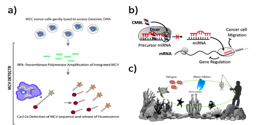
Figure 2. (a) Schematic summarizing MCV DETECTR. (b) Schematic representation of CMBL mediated regulation of miRNA biogenesis for development of miRNA targeted cancer therapy.(c) Sponge. watch program: an initiative towards one ocean one health concept.
Recent Publications:
-
Jagtap S, Pattabiraman C, Sankaradoss A, Krishna S, Roy R (2023) Evolutionary dynamics of dengue virus in India. PLoS Pathog 19(4): e1010862. https://doi.org/10.1371/journal.ppat.1010862
-
Sankaradoss A, Jagtap S, Nazir J, Moula SE, Modak A, Fialho J, Iyer M, Shastri JS, Dias M, Gadepalli R, Aggarwal A, Vedpathak M, Agrawal S, Pandit A, Nisheetha A, Kumar A, Bordoloi M, Shafi M, Shelar B, Balachandra SS, Damodar T, Masika MM, Mwaura P, Anzala O, Muthumani K, Sowdhamini R, Medigeshi GR, Roy R, Pattabiraman C, Krishna Sudhir, Sreekumar E. (2022) Immune profile and responses of a novel Dengue DNA vaccine encoding EDIII-NS1 consensus design based on Indo-African sequences. Mol Ther, 2022 Jan 6;S1525-0016(22)00013-2.
- Juma, M., Sankaradoss, A., Ndombi, R., Mwaura, P., Damodar, T., Nazir, J., Pandit, A., Khurana, R., Masika, M., Chirchi, R., Gachie, J., Krishna, S., Ramanathan, S., Anzala, O. & Iyer, M. (2021) Antimicrobial resistance profiling and phylogenetic analysis of Neisseria gonorrhoeae clinical isolates from Kenya in a resource limited setting. Frontiers in Microbiology
- Arora, R., Gupta, K., Vijaykumar, A. & Krishna, S. (2020). DETECTing Merkel Cell polyomavirus in Merkel tumours. Frontiers in Molecular Biosciences, 7, Article 10.
- Meshack Juma, Arun Sankaradoss, Redcliff Ndombi, Patrick Mwaura, Tina Damodar, Junaid Nazir, Awadhesh Pandit, Rupsy Khurana, Moses Masika, Ruth Chirchir, John Gachie, Sudhir Krishna, Ramanathan Sowdhamini, Omu Anzala, Iyer Meenakshi S, Antimicrobial resistance profiling and phylogenetic analysis of Neisseria gonorrhoeae clinical isolates from Kenya in a resource-limited setting (in communication).
- Arora, Reety, Jae Eun Choi, Paul W. Harms, and Partik Chandrani. (2020). Merkel cell polyomavirus in Merkel cell carcinoma: Integration sites and involvement of the KMT2D tumor suppressor gene. Viruses, 12, 966.
- Arora, R., Rekhi, B., Chandrani, P., Krishna, S. & Dutt. A. (2019) Merkel cell polyomavirus is implicated in a subset of Merkel cell carcinomas, in the Indian subcontinent. Microbial Pathogenesis, 137, 103778.
- Singh, A. and Krishna, S. (2019) Immunomodulatory and therapeutic potential of marine flora products in the treatment of cancer. In Bioactive Natural Products for the Management of Cancer: from Bench to Bed Side. Sharma Anil et al (Eds), 139-166, Springer-Nature, ISBN - 978-981-13-7606-1.
-
Pranatharthi, A., Thomas, P., Udayashankar, A. H., Bhavani, C., Suresh, S. B., Krishna, S., Thatte, J., Srikantia, N., Ross, C. R. & Srivastava, S. (2019). RhoC regulates radioresistance via crosstalk of ROCK2 with the DNA repair machinery in cervical cancer. Journal of experimental and clinical cancer research
-
Calvin R., Leanna RJ., Sasikala P., Sachithanandan and Sudhir K. (2019). Notch signalling in cervical cancer. Experimental Cell Research.
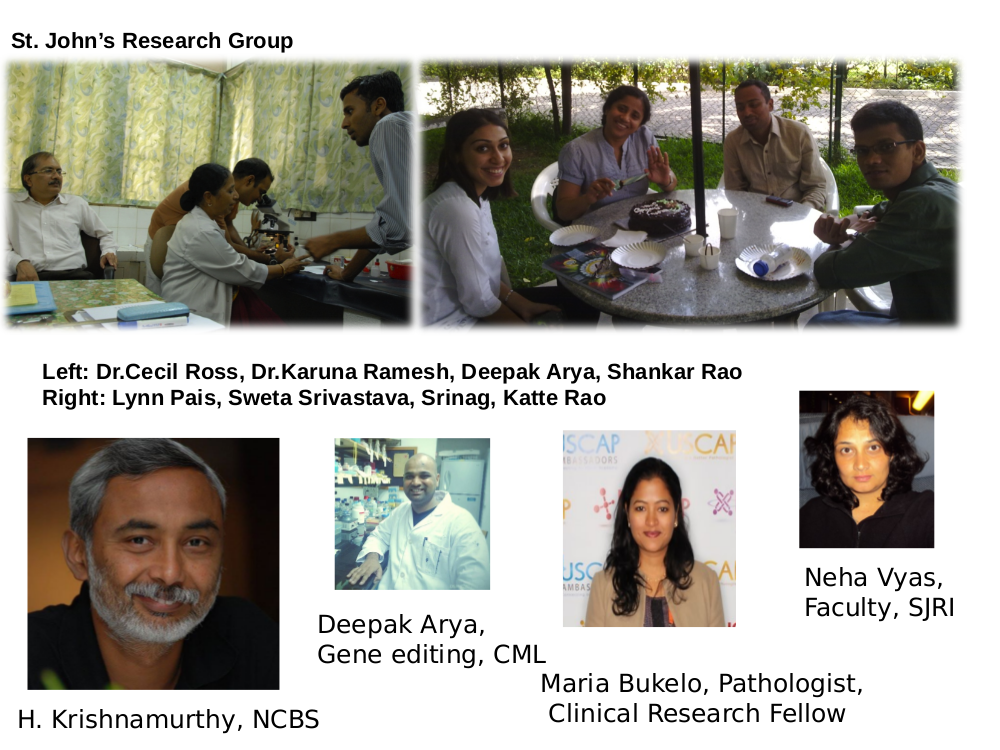
India-Africa Health Sciences Initiative:
NCBS team arriving at the KAVI Centre for Clinical Research, Nairobi to conduct workshops in nanopore sequencing of viruses and flow cytometry.
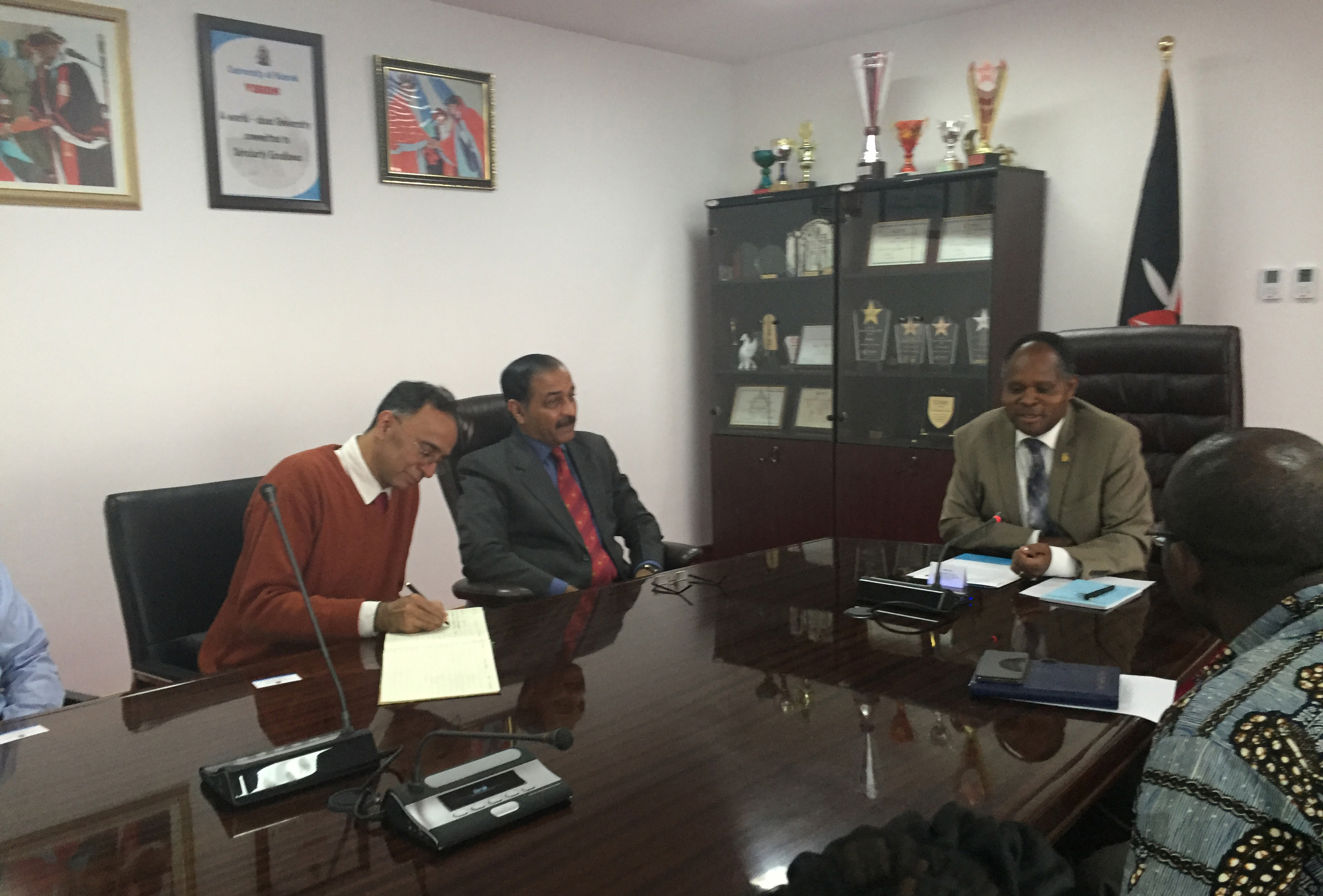
Meeting the Vice Chancellor of University of Nairobi.
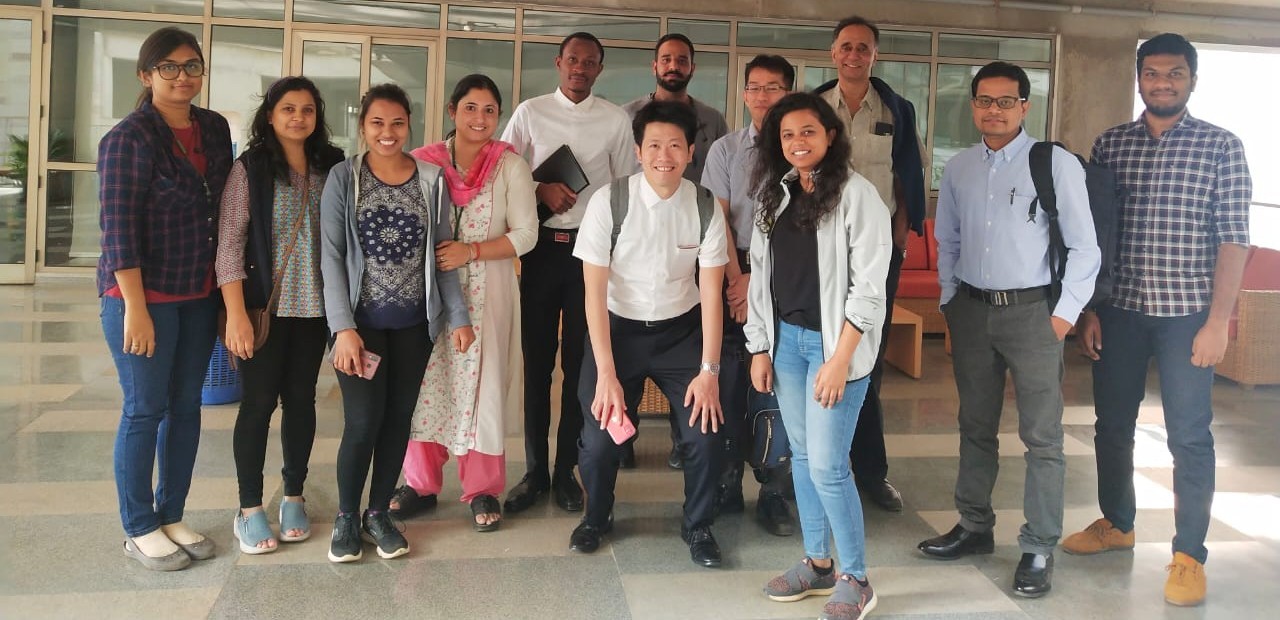
2nd Indo-Japan (NCBS/inStem-ISIR, Osaka University) Meeting: Interfacing Chemistry and Biology (17th February 2020)



